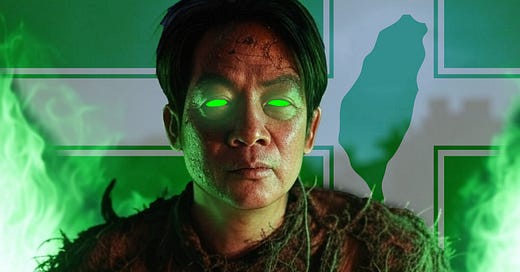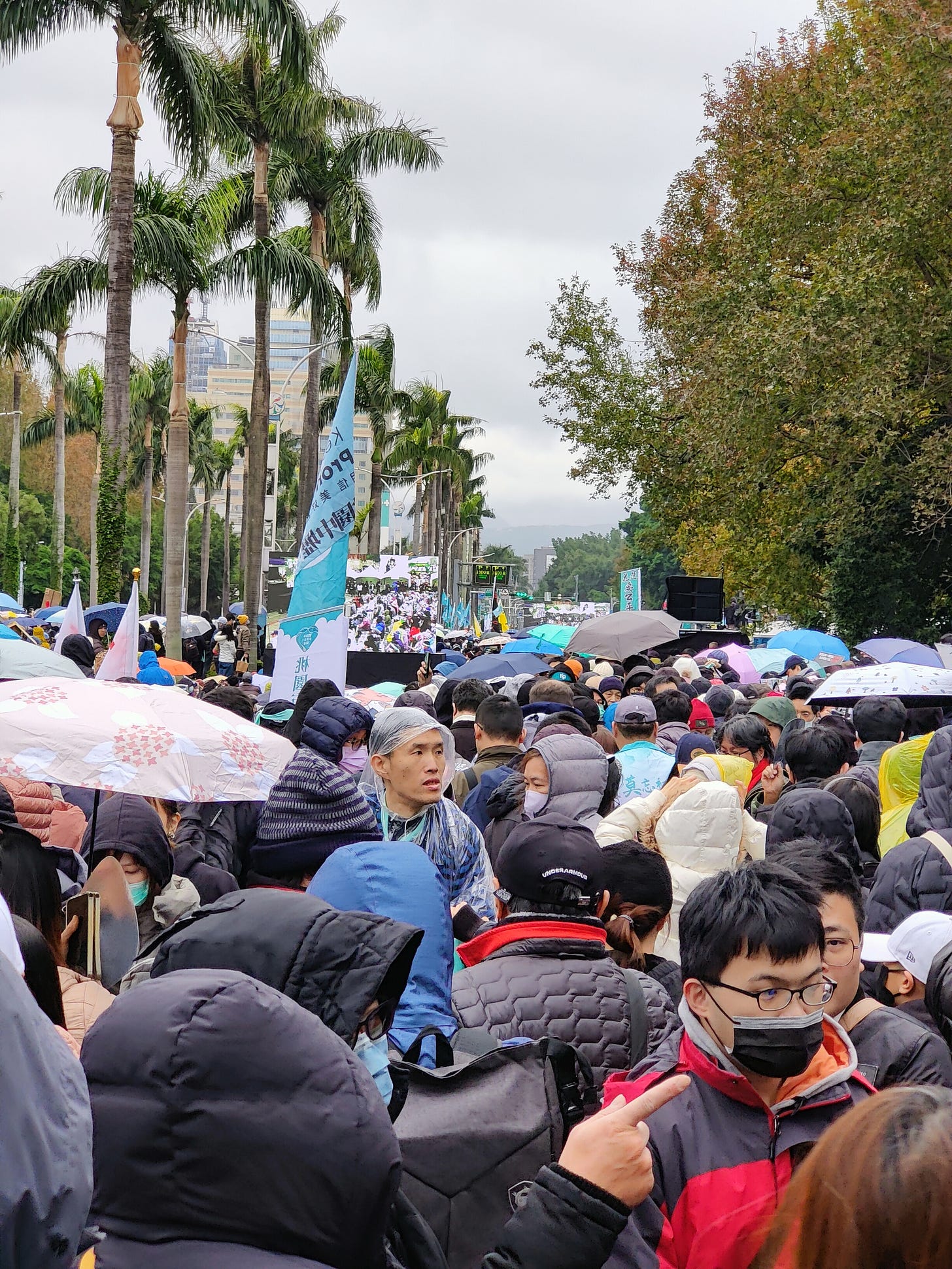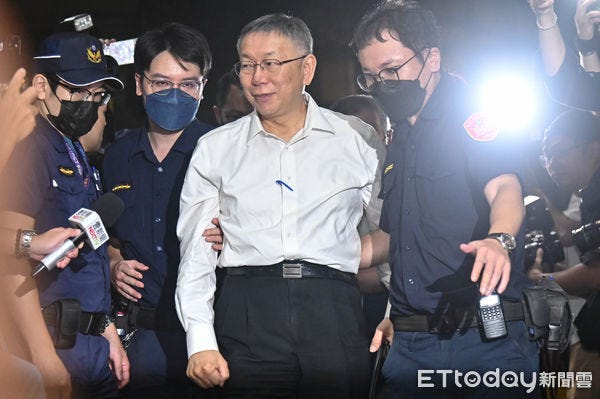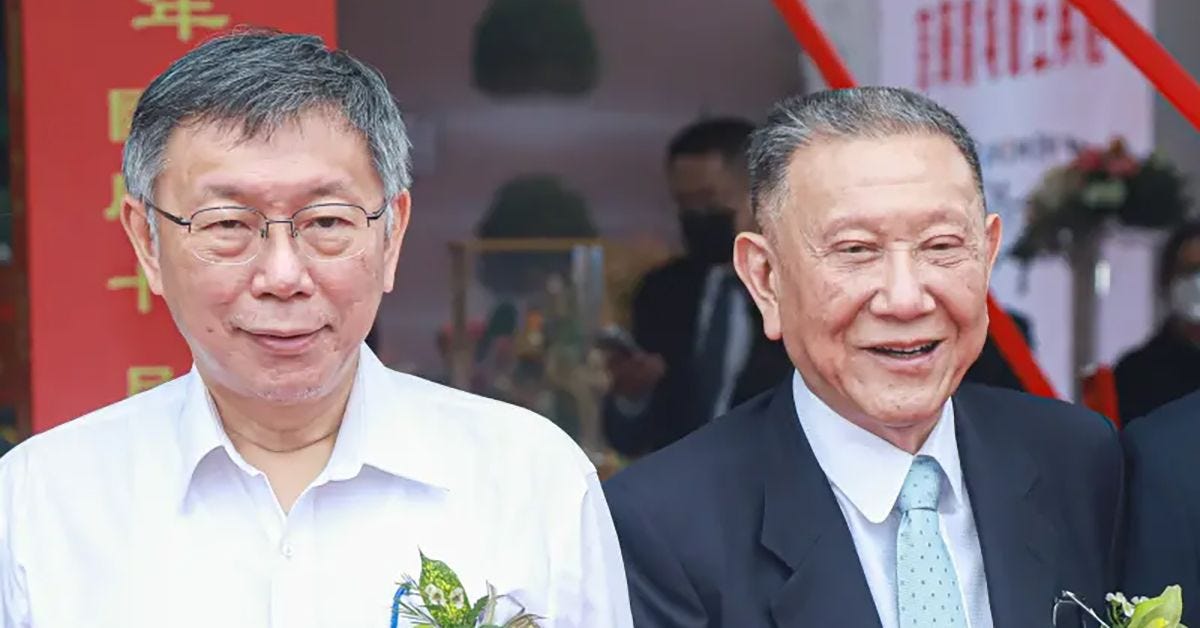In recent months, an alarming case of political lawfare has unfolded in Taiwan, with the ruling Democratic Progressive Party (DPP) leveraging the legal system against former Taipei City Mayor, 2024 Taiwan leadership candidate, and Taiwan People’s Party (TPP) founder Ko Wen-je. Despite an estimated 150,000 people taking to the streets on January 11th to protest this political persecution, international media has largely ignored the demonstration. Meanwhile, significantly smaller protests mobilized by the DPP have received substantial coverage.
This media blackout is concerning, as it suggests an intentional effort to suppress awareness of a case that undermines the very democratic principles the West often claims to uphold. As tensions between the collective West and China—particularly the mainland—continue to escalate, Western media has framed Lai Ching-te, Taiwan’s current leader, and the DPP as defenders of democracy against authoritarianism. However, the reality on the ground tells a different story, one in which the administration praised by Western powers is facing mass protests from its own citizens over its increasingly autocratic behavior.
Taiwan’s Political Landscape
To fully understand this issue, it is necessary to examine Taiwan’s current political structure. Lai Ching-te serves as the leader of the Taiwan Area (so-called “President” of the “Republic of China”) and, as a member of the DPP, holds control over the executive branch. However, the legislative branch is under opposition control. The DPP holds only 51 out of 113 seats, while the Kuomintang (KMT) holds 52, the TPP has 8, and two independent legislators hold the remaining seats.
The DPP is generally seen as more separatist-leaning, while the KMT is perceived as favoring reconciliation with Beijing. In practice, both are largely status quo parties. The TPP, founded by Ko Wen-je, has positioned itself as a new third-party alternative, focusing on local issues such as housing prices, inflation, and wages rather than the ideological debate over separatism and reunification. Currently, the KMT, TPP, and the independent legislators form a de facto united front against the DPP, controlling 62 of the 113 legislative seats.
Lai won the 2024 election with only 40% of the vote—less than 30% when accounting for abstentions—meaning the majority of Taiwan did not support him. He was able to secure victory due to the opposition’s failure to run on a joint ticket. However, with the KMT and TPP now cooperating in the legislature, there is a strong possibility that they will coordinate candidates in the 2026 local elections and the 2028 leadership election. This poses a direct threat to the DPP’s hold on power—while the DPP has proven itself capable of defeating a split opposition, it stands no chance against a unified opposition that appears to be forming between the KMT and the TPP.
Though the TPP holds only eight seats in the legislature, it has already demonstrated the power and influence a third party can wield outside the established duopoly. With the DPP and KMT holding a similar number of seats, the TPP alone can tip the balance in either direction, making it a pivotal swing bloc.
The Case Against Ko Wen-je
To understand the current controversy, it is necessary to go back to August 31, 2023. On that day, former Taipei mayor Ko Wen-je was arrested on charges related to alleged bribery and the misuse of political donations.
The case revolves around a property development project involving Core Pacific Development Group. The company sought to have a specific plot of land rezoned to accommodate its plans for a commercial plaza. Prosecutors now claim that Ko accepted bribes during his tenure as mayor in exchange for facilitating this rezoning approval.
These allegations have led to an ongoing legal battle, raising questions not only about Ko’s actions but also about the broader implications for Taiwan’s political and judicial systems. Specifically, Ko faces four charges:
Bribery
Profiteering
Embezzlement
Breach of Trust
If convicted on all counts, Ko could face a maximum sentence of 28 years and 6 months in prison. However, a review of the case raises serious concerns regarding the validity of the prosecution’s claims.
According to the indictment, Ko allegedly accepting NT$17.1 million in bribes from Core Pacific Development Group. The indictment alleges that he initially received NT$2.1 million through political donations in 2020, followed by an additional NT$15 million in cash in late 2022.
The first allegation involves seven individuals, each contributing NT$300,000 to the TPP in March 2020. Prosecutors argue that these donations were essentially an advance payment to Ko. While this arrangement may raise ethical concerns, it does not constitute bribery under the law unless it can be proven that Ko personally benefited from the funds. Political donations are legally recorded and made public, and in this case, the NT$2.1 million in question was properly documented.
The Taipei District Prosecutors' Office asserts that since the TPP is Ko’s party, and Core Pacific donated to the party, it is reasonable to infer that Ko personally profited. However, such an inference lacks concrete proof. To establish bribery, there must be direct evidence tracing the funds to Ko’s personal accounts or demonstrating a quid pro quo exchange.
The second and more serious allegation concerns a cash payment of NT$15 million. According to the indictment, Core Pacific chairman Shen Qingjing (沈慶京) withdrew NT$16 million in cash on October 18, 2022. Sometime between October 19 and November 1, prosecutors claim Ko personally received NT$15 million from Shen. However, no precise date, time, or location for this alleged transaction has been established. More importantly, investigators have not recovered the cash or identified a direct paper trail leading to Ko.
The primary piece of evidence cited is an entry in an Excel spreadsheet found on a USB drive. The document allegedly logs a transaction dated November 1, 2022, marked as “Little Shen (小沈) - 1500.” Prosecutors argue that “1500” refers to NT$15 million (15 million in Chinese is “1500 ten thousands”), but this interpretation is debatable. The figure could just as easily refer to a time of day (3 PM in military time) or another unrelated notation. Furthermore, personal Excel records do not constitute verifiable financial evidence.
The prosecution claims that nine other transactions recorded in the spreadsheet have been verified, using this as justification for treating the NT$15 million entry as legitimate. While this may raise suspicions, it does not meet the standard of proof required in a court of law. Inferring guilt based on circumstantial evidence sets a dangerous precedent.
To illustrate the weakness of this argument, consider an analogy: if someone were to create a spreadsheet listing all the people they have dated and included a celebrity like Christina Aguilera, would that be sufficient proof of a past relationship? Clearly not.
The other piece of evidence put forth by prosecutors is a message Ko allegedly sent via the LINE messaging app to TPP legislator Huang Shanshan (黃珊珊). The message reportedly states, “Shen’s has already given it, no need to see him again.” However, the wording is ambiguous—there is no clear indication of what was given or whether it refers to the alleged bribe.
If these two pieces of evidence—a personal spreadsheet entry and a vague text message—are the strongest proof against Ko, then the case appears alarmingly weak.
Despite the lack of definitive evidence, Ko has been detained for nearly six months. Given the circumstances, it is difficult to ignore the possibility that his detention is politically motivated. Keeping him out of the public eye while the Democratic Progressive Party (DPP) leverages media narratives against him appears to be a deliberate strategy.
If Ko is guilty, then either he is exceptionally skilled at concealing financial transactions, or the investigators are remarkably inept. The other possibility remains that he is, in fact, innocent.
Regardless of one’s stance on Ko Wen-je, due process must be upheld. Without irrefutable evidence, prolonged detention and prosecution based on inference rather than concrete proof set a troubling precedent for Taiwan’s legal and political systems.
Such circumstantial evidence would not normally be sufficient to justify prolonged detention, yet Ko has remained incarcerated for nearly six months. This strongly suggests that his detention is politically motivated, aimed at silencing him while the DPP uses its media influence to damage his reputation.
The Role of the Media and Judiciary
Adding to suspicions of political interference, the Taiwanese tabloid Mirror Media (鏡週刊) has played a central role in shaping public perception of the case. Since the arrest of Ko, Mirror Media has published a series of reports detailing the allegations against him, including claims related to political donations, the NT$15 million payment, and the now-infamous Excel spreadsheet.
What has raised suspicion, however, is the striking similarity between Mirror Media’s reports and the official indictment. Given that legal investigations are supposed to be confidential, questions naturally arose about whether the Taipei District Prosecutor’s Office had been leaking information to the tabloid. When pressed on the matter, Mirror Media refused to disclose its sources. Interestingly, the indictment itself explicitly states that the findings published by the media did not originate from the Taipei District Prosecutor’s Office—conveniently absolving the prosecutors from any responsibility to investigate the matter further.
This lack of scrutiny has led many in Taiwan to suspect a coordinated effort between the prosecution and the media to shape public perception of Ko’s guilt before the legal process could properly unfold. The Taipei District Prosecutor’s Office has even been mockingly referred to as the “Mirror Media Prosecutor’s Office” due to its apparent alignment with the tabloid’s reporting.
This raises serious concerns about Ko’s right to a fair trial. Having been detained since August 31, he has been unable to publicly respond to the allegations while the media continues to attack his character. Furthermore, suspected leaks to Mirror Media have been widely cited by pro-DPP outlets without any legal consequences.
Given this dynamic, the TPP has openly questioned the independence of the Taipei District Prosecutor’s Office, arguing that it is operating under the influence of the ruling DPP. After all, the prosecutor’s office falls under the Ministry of Justice, which in turn is overseen by the Executive Yuan—currently under DPP control.
This case appears to be a textbook example of “lawfare,” where the legal system and media are weaponized to politically neutralize an opponent, despite the prosecution’s apparent lack of concrete evidence against Ko Wen-je.
Public Backlash and the DPP’s Response
The recent protest, estimated to have been attended by 150,000 people, was a direct response to what many see as “Green Authoritarianism”—a reference to the DPP and its alleged abuse of judicial power. Just as the Democratic Party in the US is associated with blue and the Republicans with red, in Taiwan, the DPP is represented by green.
Protesters argue that the DPP is obstructing justice and weaponizing the judiciary to eliminate political opposition. Rather than addressing these concerns, the DPP has doubled down, accusing both the KMT and the TPP of being proxies for the Communist Party of China (CPC) and dismissing their supporters as victims of Beijing’s propaganda.
Ironically, while the DPP calls for unity against “external enemies,” it is aggressively sowing divisions and targeting political opponents rather than engaging in dialogue. This raises an important question: What steps has Lai Ching-te taken to foster unity? Has he reached out to KMT Chairman Eric Chu (朱立倫) or TPP acting chair Huang Kuo-chang (黃國昌) to establish a working relationship?
For comparison, during Chen Shui-bian’s leadership (2000-2008), he found himself in a similar position—having narrowly won the election while facing an opposition-controlled legislature. Recognizing the need for cooperation, he made it a priority to meet regularly with Legislative Speaker Wang Jinping (王金平) of the KMT.
Lai, however, has taken the opposite approach. His party has been aggressively labeling any dissenting voice as a CPC sympathizer. The accusations have become so broad that even a staunch supporter of the CPC might feel unremarkable in Taiwan—after all, nearly everyone who opposes the DPP is being painted in the same light.
Why the DPP Sees the TPP as a Threat
Taiwan has seen third parties before—the People First Party (PFP), the New Party, and the New Power Party (NPP). But none have provoked the DPP quite like the TPP.
The PFP and the New Party were KMT offshoots, meaning the DPP viewed them as extensions of the KMT rather than truly independent forces. The NPP, born out of the 2014 Sunflower Movement (or as I call it, the Sunflower Color Revolution), was a baizuo party akin to the US “Squad,” though nominally separate from the DPP, whereas the “Squad” was a faction within the Democratic Party. Many of the NPP’s figures—such as Freddy Lim and Wu Cheng—eventually merged into the DPP, while Huang Kuo-chang defected to the TPP. Having helped corral the youth into supporting the DPP and getting Tsai Ing-wen elected in 2016, the party has since faded into irrelevance over the course of Tsai’s leadership.
The DPP’s hostility toward the TPP stems from the fact that it has attracted disillusioned former DPP supporters. Unlike the NPP, which often aligned with the DPP, the TPP has actively opposed it and held it accountable. As a result, hardcore DPP loyalists see the TPP not just as an opponent, but as a party of “traitors.”
However, for those who left the DPP for the TPP, the sentiment is different—they feel it is the DPP that has betrayed its own principles and the people it once claimed to represent.
Conclusion: The Silence of Western Media
The near-total international media blackout of this case is no coincidence. While much smaller protests have been extensively covered, this large-scale demonstration has been ignored, reflecting a broader trend of selectively promoting narratives that align with Western geopolitical interests. The ruling elite, both in Taiwan and abroad, have a vested interest in maintaining the illusion that the DPP is a champion of democracy. In reality, its actions suggest otherwise.
As the DPP continues to erode democratic norms to maintain its grip on power, it is essential to shed light on these issues. If the public, particularly in the United States, were made aware of the realities of Lai Ching-te’s administration, they would be far less inclined to support the Taiwan lobby’s (read DPP lobby) influence in Washington. With mainstream media refusing to report on these developments, it falls on independent voices to share the truth.
By exposing these injustices, we can hold those in power accountable and push back against the growing trend of green authoritarianism disguised as democracy.







